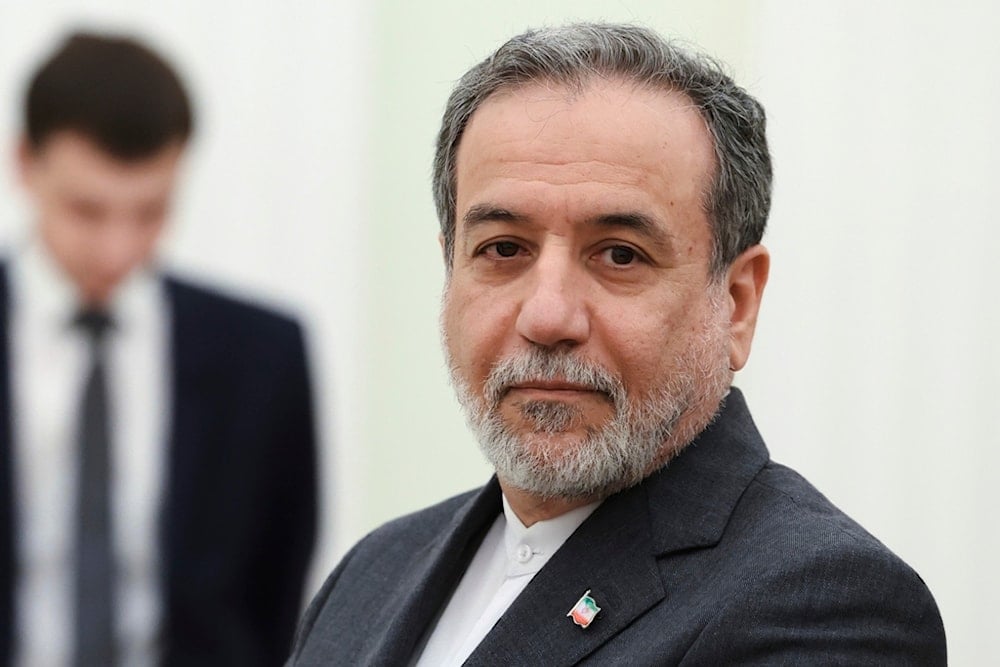US obstruction caused collapse of sanctions talks: Iran FM
Iran’s Foreign Minister Abbas Araghchi blames the US and its European allies for obstructing UN talks on the snapback mechanism, saying their excessive demands derailed efforts to prevent renewed sanctions despite Tehran's reasonable proposals.
-

Iranian Foreign Minister Abbas Araghchi stands waiting to meet Russian President Vladimir Putin for the talks at the Kremlin in Moscow, Russia, Monday, June 23, 2025. (Alexander Kazakov, Sputnik, Kremlin Pool Photo via AP)
Iran's Foreign Minister Abbas Araghchi said that negotiations in New York aimed at halting the reactivation of UN sanctions against Tehran failed due to Washington's excessive and unrealistic demands, which were fully supported by European governments.
Speaking to reporters before departing New York, Araghchi outlined the scope of Iran's diplomatic mission, which included high-level meetings at the UN General Assembly, discussions on the snapback mechanism, and extensive consultations with global officials. He said the talks revealed that the United States and its allies sought to impose conditions beyond reason, while Iran remained committed to presenting fair and balanced solutions.
"An attempt was made to reach a settlement between the proposals of the two sides, but due to the excessive demands of the Americans and the support of the European countries, we were unable to reach a settlement," Araghchi explained.
He stressed that Iran had introduced "completely reasonable" proposals, which European representatives themselves acknowledged as fair. However, despite these efforts, Western negotiators insisted on unachievable concessions, preventing any meaningful progress.
Diplomacy Under Siege
The impasse came after the E3 (Britain, France, and Germany) invoked the snapback clause under the 2015 Joint Comprehensive Plan of Action (JCPOA), alleging Iranian non-compliance. A draft resolution designed to block the reimposition of sanctions was rejected by the UN Security Council on September 19, followed by the failure of a second proposal to extend the JCPOA and Resolution 2231 for six months.
Araghchi described the outcome as proof of Western double standards, where Iran's goodwill diplomacy was met with political obstruction. He said Tehran's diplomatic initiative, from submitting detailed proposals to engaging in constructive exchanges, demonstrated Iran's commitment to peaceful dialogue and its steadfast defense of national sovereignty.
"The numerous meetings, the various proposals that we put on the table... all of these things were done," Araghchi noted. "Tehran will take whatever action is necessary to protect Iran's interests until the very last moment."
The foreign minister also confirmed that messages were exchanged with Washington, both directly and indirectly, but said the failure of talks only reaffirmed a long-held belief in Tehran. "We are relieved that we did what was necessary and it was confirmed," he stated, referring to the spiritual leader of the Islamic Revolution Sayyed Ali Khamenei's position that negotiations with the United States are in complete deadlock.
Principled resistance
Sayyed Khamenei has repeatedly warned against engaging with the US under pressure, asserting that "accepting talks under threat is something no honorable nation would ever do, and no wise statesman would ever endorse." Araghchi said this round of negotiations had proven the wisdom of that stance, exposing Washington's unwillingness to act in good faith.
Regarding the potential impact of renewed UN measures, Araghchi dismissed Western threats as largely symbolic, explaining that no additional sanctions would be imposed beyond those already enforced by Washington.
"No more sanctions will be imposed than those previously imposed by the United States," he said, noting that any new restrictions would be political rather than practical. "They will bring political and sometimes strategic effects in their place, which we must also confront."
Looking ahead, Araghchi affirmed that Iran's response would be guided by the Supreme National Security Council, which will determine the next course of action, including Tehran's level of engagement with the International Atomic Energy Agency (IAEA), strictly in line with national interests.
Read more: Lavrov blasts E3 for sabotaging Iran nuclear talks, fueling sanctions

 4 Min Read
4 Min Read










